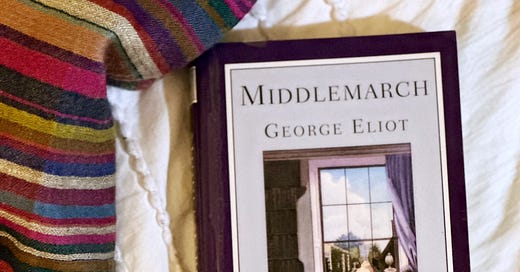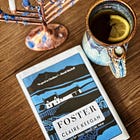How I'm reading Middlemarch in an age of TikTok
Trading Instagram reels for a 500-page Victorian novel.
Let's talk about the elephant in the room: Americans aren't reading books.
A measly 32% of us read for pleasure, and 44% don't crack open a single book all year.
And I just picked up a 500-page Victorian novel with language so dense I usually need a dictionary on hand.
Ridiculous? Maybe.
But hear me out.
Fresh out of university in the '90s, I landed an unpaid internship at Index on Censorship in London, working under Ursula Owen, one of Virago Press' first directors.
That was where I first grasped how women's voices were systemically excluded from publishing.
This decisive experience helped me appreciate the novel Middlemarch, written by Mary Ann Evans under the pen name George Eliot. (Because forget about a female author being taken seriously in the 1870s.)
Recently, I checked it out from the library. I wanted to see if I could still handle this brick of a book with its archaic language and Victorian social codes that required as much imagination as time travel.
Could I make it past 100 pages with my current attention span wrecked by years of scrolling and streaming?
The world of calling cards, carriage rides, and carefully negotiated marriages always felt strangely familiar yet also light years from anything I knew.
Evans used the pseudonym George Eliot because being a female author meant her work would be dismissed as frivolous romance. (And because of her scandalous personal life.) But she was tackling the heavyweight issues of her day and, as it turns out, our day, too.
Gender equality, the collision of idealism with self-interest, the nature of marriage, religious hypocrisy, and political reform. She wrote about people grappling with the gap between who they wanted to be and who they were becoming.
This makes a classic truly classic – not its age or difficulty, but its ability to illuminate something fundamental about humanity.
As I started rereading, I realized Evans wasn't writing morality tales about idealistic heroes. She was writing about the raw, complicated reality of relationships with society and self, with a dry sense of humor that pierces into the hearts of hypocrites.
How our noble intentions tangle with our egos, how our hopes and delusions of changing the world crash into our need to belong.
These struggles are as relevant today as they were in Victorian England.
(Our reality is not as different as we'd like to think.)
And she published it in eight parts, a bit like authors on Substack these days.
Look, the numbers are pretty grim. When only half of Americans pick up 1-2 books a year while places like Luxembourg have 75% of people reading regularly, we've got problems.
Every time we skip the hard stuff, the books that make us think, look up words, and wrestle with complex ideas – we're letting those mental muscles get a little weaker.
They're mirrors showing us who we are, who we've been, and sometimes unnervingly – where we’re still stuck.
It's like deciding that walking up the stairs is too much work, so you hop on the elevator instead. Sure, it's easier. But at what cost? (Probably your 10,000 steps.)
So yes, I'm making the case for reading one maddeningly complex, beautifully crafted classic a year. (Even if you don’t finish it.😜)
Not because it's good for you, like literary vegetables, but because these books have survived for a reason.
They’ll improve your writing and your critical thinking. Writers need a healthy reading diet.
Next on my list?
Maybe Fahrenheit 451. With the current wave of book bans sweeping across America, Bradbury's story about firefighters burning books hits differently. Written in 1953, inspired by Nazi book burnings and McCarthy's witch hunts, it's less science fiction and more Index on Censorship these days.
I'd love to hear from you: Is there room in your reading life for one classic?
What do you think we’ll miss out on if we don't try?
📚 Reading & Writing Corner:
Why is Everyone Reading Middlemarch Right Now? Stumbled across
A Reading Life after checking out Middlemarch from the library and realizing I was part of some literary zeitgeistWhere to start with George Eliot - A primer from The Guardian if you're ready to dive into this classic novelist
Vocabulary.com has a Victorian literature list if you’re feeling adventurous
Print vs. Digital Reading - The Guardian explains why our brains still prefer paper (and why that matters)
Classic vs. Contemporary Literature - Two high school students duke it out in their school paper, giving me hope for the next generation
Can Influencers Predict the Next Big Thing in Books? - Elle investigates how social media is reshaping what we read (and maybe why we're reading less of the hard stuff)
The Quiet Rebellion of a Little Life - Richardson nails the absurdity of chasing success in an era obsessed with performative simplicity while reminding us that the richest lives often happen off-camera
The 30 Best Classic Novels Everyone Should Read - Forbes list (take with a grain of salt - they missed Maya Angelou), but there are some great books on it!
📚 On My Nightstand:
📚 Middlemarch - George Eliot
📚 In Her Boots - Found this through Dell'Antonia's #AmReading Substack and it's and it's a deliciously escapist read about reinvention gone wrong. When Rhett Gallagher's life implodes at 40, she does what any rational person would do: convinces her best friend to impersonate her as a successful "pioneer woman" author to save her family farm. It's funny and messy and real about what happens when the story we're telling the world doesn't match the one we're living.
📚 Ctrl Alt Delete- How I Grew Up Online: Way before launching The Hyphen (her Substack that hooked me), she wrote this debut memoir (in 2016), part time capsule, and part true confessions about coming of age alongside the internet. She nails that weird tension we all navigate: how the internet shapes who we are while we're busy shaping how we appear online. Her next book, Table for One, comes out in April!
Until next week,
P.S. We’re on for a subscriber chat tomorrow, Thursday, 2/13, at 1 pm Central Time. Let's talk about classics, reading habits, and whether that copy of Pride and Prejudice on your shelf is giving you the side-eye.
If you enjoyed this, you might also enjoy:












Exactly why I still get my news from the Economist weekly print edition.
Jen, you are spot on in my book! Since the beginning of the year, I've enjoyed "This is Happiness" and "Time of the Child" by Niall Williams, as well as "Brooklyn" and "Long Island" by Colm Tóibín. (All Ireland-related). Reading about other people, times, and places is providing me with much-needed solace and perspective. (Reading actual books also prevents "brain rot." Alarmingly, this was Oxford's word of the year for 2024). Our local libraries and independent books stores are cultural bulwarks. Thanks for this gem!